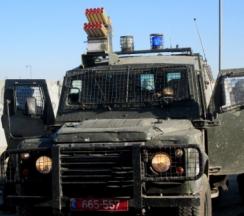Qalandiya
The dawn invasion by soldiers from Duvdevan of the Qalandiya refugee camp was the first link in a chain of incidents which could best be described as the chronicle of a death foretold.
Mahmoud Abdullah Adwan, age 21, was the victim this time.
Mahmoud climbed onto the roof, wanted to see what was happening, said his father to a British journalist I spoke to, one soldier, a sniper, shot him from below. The bullet entered through his throat, passed through his skull and exited through the forehead.
The refugee camp mourned.
Mourning and lamenting Mahmoud, remembering also the others who were murdered.
Weeping for the sons and brothers and fathers, mourning friends and neighbors.
The walls of the camp’s buildings support each other, as do their inhabitants, whose lives and deaths are intertwined.

While the funeral was underway units of various security forces gathered outside the camp waiting, armed and ready.
When the funeral had ended the children burst from the alleys, climbed onto the roofs, onto the hill next to the wall and threw rocks.
In response the soldiers fired and fired and fired and fired.
Many tear gas grenades and stun grenades were fired.
The malkosh accompanied the soldiers (it was the first time I’d seen it in action at Qalandiya):
The malkosh has twenty firing tubes and is installed on the roof a vehicle; all are fired simultaneously by pressing a button inside the vehicle.
An innovation in the arsenal of dispersing demonstrations whose damage is very, very serious.
The grenades fired from the malkosh rise into the air, leave a trail of white smoke behind them and descend on the children in a dense, suffocating gas cloud.
Many years ago an attempt was made to create here an agricultural society. People waited for rain in its season and hoped “the earth would bring forth bread.” As the years passed, things changed. People no longer pray for blessed rains but entreat the god of hosts and war.
The malkosh no longer refers to rain, the rimon is no longer a fruit and the ze’ev is no longer an animal.
And the same has become of the truth, which is now distorted and becomes P.R. Someone’s truth, for a purpose.
The army’s version of how Mahmoud was killed:
“During military activity by the Duvdevan unit to arrest a wanted person, the unit was fired on. As a result fire was exchanged between the armed persons and the army, and an improvised explosive device was thrown at the soldiers. They responded by firing at the person who threw the device and he was killed.”
http://www.haaretz.co.il/news/politics/1.2513297
“My grandfather used to say to my father: Look, in fifty year things will be good. My father used to say to me: “Look, in fifty years things will be good. I say the same thing to my children, I tell them that in fifty years things will be good. But I don’t really believe what I’m saying, I know things will never be good.”
That’s what Abu-Niyaz said.
